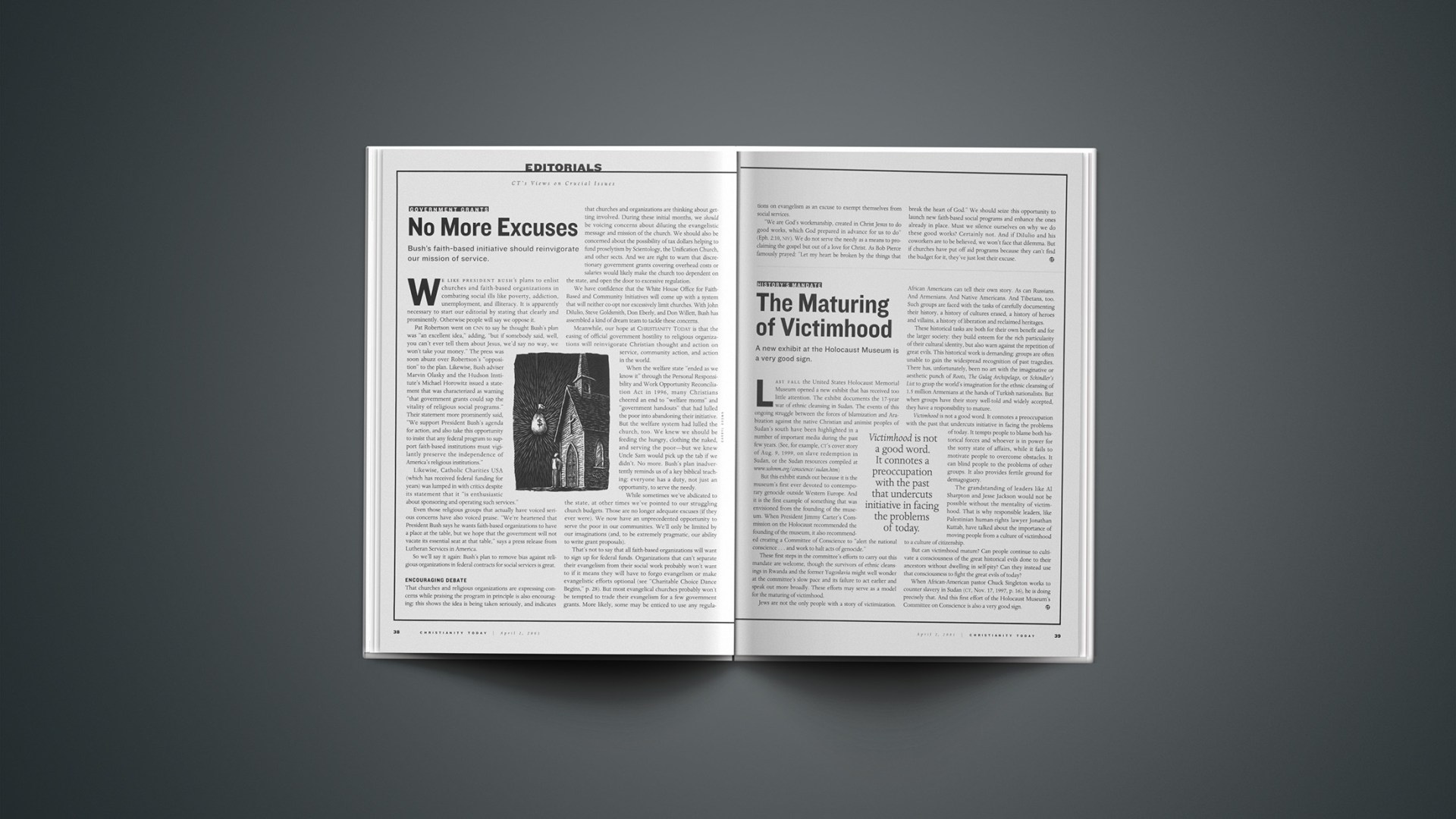We like President Bush’s plans to enlist churches and faith-based organizations in combating social ills like poverty, addiction, unemployment, and illiteracy. It is apparently necessary to start our editorial by stating that clearly and prominently. Otherwise people will say we oppose it.
Pat Robertson went on CNN to say he thought Bush’s plan was “an excellent idea,” adding, “but if somebody said, well, you can’t ever tell them about Jesus, we’d say no way, we won’t take your money.” The press was soon abuzz over Robertson’s “opposition” to the plan. Likewise, Bush adviser Marvin Olasky and the Hudson Institute’s Michael Horowitz issued a statement that was characterized as warning “that government grants could sap the vitality of religious social programs.” Their statement more prominently said, “We support President Bush’s agenda for action, and also take this opportunity to insist that any federal program to support faith-based institutions must vigilantly preserve the independence of America’s religious institutions.”
Likewise, Catholic Charities USA (which has received federal funding for years) was lumped in with critics despite its statement that it “is enthusiastic about sponsoring and operating such services.”
Even those religious groups that actually have voiced serious concerns have also voiced praise. “We’re heartened that President Bush says he wants faith-based organizations to have a place at the table, but we hope that the government will not vacate its essential seat at that table,” says a press release from Lutheran Services in America.
So we’ll say it again: Bush’s plan to remove bias against religious organizations in federal contracts for social services is great.
Encouraging Debate
That churches and religious organizations are expressing concerns while praising the program in principle is also encouraging: this shows the idea is being taken seriously, and indicates that churches and organizations are thinking about getting involved. During these initial months, we should be voicing concerns about diluting the evangelistic message and mission of the church. We should also be concerned about the possibility of tax dollars helping to fund proselytism by Scientology, the Unification Church, and other sects. And we are right to warn that discretionary government grants covering overhead costs or salaries would likely make the church too dependent on the state, and open the door to excessive regulation.
We have confidence that the White House Office for Faith-Based and Community Initiatives will come up with a system that will neither co-opt nor excessively limit churches. With John DiIulio, Steve Goldsmith, Don Eberly, and Don Willett, Bush has assembled a kind of dream team to tackle these concerns.
Meanwhile, our hope at Christianity Today is that the easing of official government hostility to religious organizations will reinvigorate Christian thought and action on service, community action, and action in the world.
When the welfare state “ended as we know it” through the Personal Responsibility and Work Opportunity Reconciliation Act in 1996, many Christians cheered an end to “welfare moms” and “government handouts” that had lulled the poor into abandoning their initiative. But the welfare system had lulled the church, too. We knew we should be feeding the hungry, clothing the naked, and serving the poor—but we knew Uncle Sam would pick up the tab if we didn’t. No more. Bush’s plan inadvertently reminds us of a key biblical teaching: everyone has a duty, not just an opportunity, to serve the needy.
While sometimes we’ve abdicated to the state, at other times we’ve pointed to our struggling church budgets. Those are no longer adequate excuses (if they ever were). We now have an unprecedented opportunity to serve the poor in our communities. We’ll only be limited by our imaginations (and, to be extremely pragmatic, our ability to write grant proposals).
That’s not to say that all faith-based organizations will want to sign up for federal funds. Organizations that can’t separate their evangelism from their social work probably won’t want to if it means they will have to forgo evangelism or make evangelistic efforts optional. But most evangelical churches probably won’t be tempted to trade their evangelism for a few government grants. More likely, some may be enticed to use any regulations on evangelism as an excuse to exempt themselves from social services.
“We are God’s workmanship, created in Christ Jesus to do good works, which God prepared in advance for us to do” (Eph. 2:10, NIV). We do not serve the needy as a means to proclaiming the gospel but out of a love for Christ. As Bob Pierce famously prayed: “Let my heart be broken by the things that break the heart of God.” We should seize this opportunity to launch new faith-based social programs and enhance the ones already in place. Must we silence ourselves on why we do these good works? Certainly not. And if DiIulio and his coworkers are to be believed, we won’t face that dilemma. But if churches have put off aid programs because they can’t find the budget for it, they’ve just lost their excuse.
Copyright © 2001 Christianity Today. Click for reprint information.
Related Elsewhere
See today’s related news article, “Charitable Choice Dance Begins | Faith-based organizations cautious but eager for government aid.”The Christianity Today Weblog regularly covers the charitable choice debate. In the last few days, for example, it took note of the comment by Don Eberly, deputy director of the White House Office of Faith-Based and Community Initiatives, that office was postponing its plans—and Bush’s subsequent denial of the delay.
The Center for Public Justice Web site offers reams of information about “charitable choice” plans past and present










